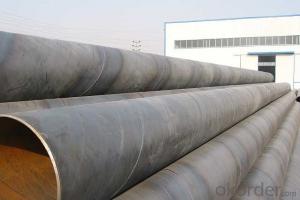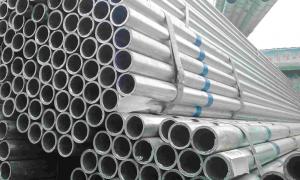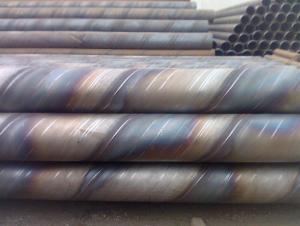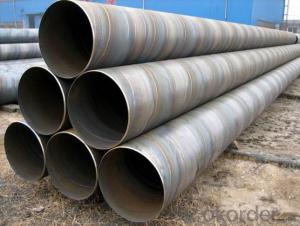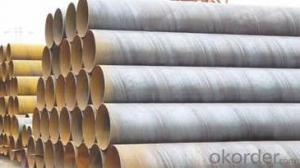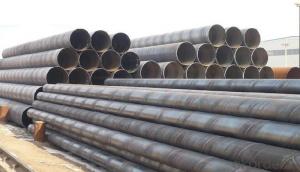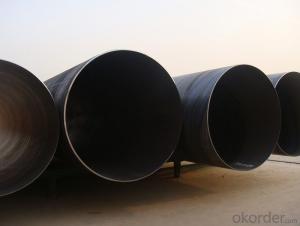SPIRAL STEEL PIPE 52‘‘ ASTM API LARGE DIAMETER PIPE
- Loading Port:
- Tianjin
- Payment Terms:
- TT OR LC
- Min Order Qty:
- 5 m.t.
- Supply Capability:
- 3000 m.t./month
OKorder Service Pledge
OKorder Financial Service
You Might Also Like
Packaging & Delivery
Packaging Detail: | standard export packing or as customer's requirement |
Delivery Detail: | within 10 - 30 days |
Specifications
Spiral Welded Steel Pipes and Tubes
1.Material:Q195-Q235
2.Length:1-12m
3.WT:1.0-14mm
4.O.D.:20-273mm
Spiral Welded Steel Pipes and Tubes
Product Description:
1.Material : Q235,Q345,L245,L290,L360,L415,L450,L485,GrB,X42,46,X52,X56,X60,X65,X70,X80,X100
2,Standard: SY/T5037-2000,GB/T9711-2011,API Spec 5L PSL1/PSL2,ASTM A252\A53,ISO3183,DIN17172,EN10217,JIS G3457,AWWA C200,ASTM A139,ASTM A671,ASTM A672
3.Wall thickness: 3.0mm-30mm
4.Outer diameter: φ168mm-3020mm
5,Length: 5m-12m or as your requirement
6,Corrosion protection standard: DIN30670,DIN30671, AWWAC210, AWWA C203, SY/T0413-2002,SY/T0414-2002
7,Application: Oil, gas, natural gas, water pipe, thermal electricity pipe, steel structure engineering, etc
Q195-q345 Material Steel Pipe's Materials
Elements | Chemical Compsition% | Mechanical Property | ||||||
C% | Mn% | S% | P% | Si% | Yield Point (Mpa) | Tensile Strength(Mpa) | Elongation | |
Q195 | 0.06-0.12 | 0.25-0.50 | <0.050< span=""> | <0.045< span=""> | <0.030< span=""> | >195 | 315-430 | 32-33 |
Q215 | 0.09-0.15 | 0.25-0.55 | <0.05< span=""> | <0.045< span=""> | <0.030< span=""> | >215 | 335-450 | 26-31 |
Q235 | 0.12-0.20 | 0.30-0.70 | <0.045< span=""> | <0.045< span=""> | <0.030< span=""> | >235 | 375-500 | 24-26 |
Q345 | <0.20< span=""> | 1.0-1.6 | <0.040< span=""> | <0.040< span=""> | <0.55< span=""> | >345 | 470-630 | 21-22 |
- Q: Does seamless steel tube have a bend of 135 degrees?
- In engineering, it is usually marked as "45 elbow" and has no "135" mark. The angle of the elbow is acute, so there will be no more than 90 degrees elbow.Elbow is a common connecting pipe used in plumbing and heating. It is used for the connection of the bend of pipe, and is used to change the direction of pipe.
- Q: What are the different methods of repairing damaged steel pipes?
- There are several methods of repairing damaged steel pipes, including welding, epoxy lining, pipe bursting, and pipe relining. Welding involves joining the damaged sections of the pipe together using heat, while epoxy lining involves applying a protective coating to the inner surface of the pipe. Pipe bursting involves replacing the damaged pipe with a new one by pulling it through the existing pipe, and pipe relining involves inserting a new liner into the damaged pipe to create a new, seamless pipe within the existing one. The choice of method depends on factors such as the extent of damage, accessibility, and cost-effectiveness.
- Q: What are the common fittings and accessories used with steel pipes?
- There are several common fittings and accessories used with steel pipes in various applications. These fittings and accessories are essential for connecting, redirecting, controlling, and supporting the flow of fluids or gases through the pipe system. One of the most commonly used fittings is the steel pipe elbow, which allows for a change in direction of the pipe. Elbows are available in different angles, such as 45 degrees or 90 degrees, to accommodate specific piping needs. They are used to prevent sharp bends that could cause flow restrictions or pressure drops. Another common fitting is the steel pipe tee, which has three openings in the shape of a "T". Tees are used to create branch connections to redirect the flow of fluids or gases into multiple directions simultaneously. Steel pipe reducers are fittings used to connect pipes of different sizes. They come in two types, concentric reducers and eccentric reducers. Concentric reducers have a symmetrical design and allow for a smooth transition between pipes of different diameters. Eccentric reducers, on the other hand, have an offset design and are used when there is a need to align pipes at different levels. Couplings are fittings used to join two pipes together. They come in different types, such as threaded or socket weld couplings, and provide a secure and leak-proof connection between pipes. Flanges are another common accessory used with steel pipes. They are flat, round plates with holes in the center that allow for the connection of pipes, valves, or other equipment. Flanges are typically used in applications that require easy access for inspection, cleaning, or maintenance. Other common fittings and accessories include steel pipe caps, which are used to seal the ends of pipes, and steel pipe nipples, which are short lengths of pipe used to extend or connect two fittings. It is important to note that the selection of fittings and accessories for steel pipes depends on the specific application, such as the type of fluid or gas being transported, the pressure and temperature requirements, and the overall system design. Consulting with a professional or referring to industry standards is recommended to ensure the correct fittings and accessories are chosen for a particular steel pipe system.
- Q: How are steel pipes used in the manufacturing of automotive exhaust systems?
- Steel pipes are used in the manufacturing of automotive exhaust systems as they provide durability, strength, and corrosion resistance required to withstand high temperatures and harsh conditions. These pipes are used to transport exhaust gases from the engine to the rear of the vehicle, ensuring efficient emission control and noise reduction.
- Q: What are the common materials used for pipe fittings in steel pipes?
- The common materials used for pipe fittings in steel pipes include carbon steel, stainless steel, and alloy steel. Carbon steel pipe fittings are widely used due to their affordability, strength, and durability. They are suitable for various applications, including oil and gas, petrochemical, and water distribution systems. Stainless steel pipe fittings are highly resistant to corrosion and are commonly used in industries that require a high level of hygiene, such as food and beverage and pharmaceutical industries. Alloy steel pipe fittings are composed of multiple elements, such as chromium, nickel, and molybdenum, to enhance their strength and resistance to corrosion. These fittings are often used in high-pressure and high-temperature applications, such as power plants and chemical plants. Overall, the choice of material for pipe fittings in steel pipes depends on the specific requirements of the application and the environment in which they will be used.
- Q: Heating system DN40 and DN32 welded steel pipe how to connect?
- Welding: AC arc welding machine welding. Mode 1: apply to the medium of non demanding piping, DN40 steel pipe necking and DN32 steel pipe butt welding, or directly DN32 steel pipe into the DN40 internal welding. 2: the pipeline requirements apply to the inner wall of smooth transition, reducing short circuit welding for DN40x32 suppression of this mechanism are used for connection pipe seamless steel pipe high pressure pipeline connection, no special requirements, not commonly used welded steel pipe. Connection of mechanism fittings is not only costly, but not necessary unless special requirements are required!
- Q: How do you protect steel pipes from rusting?
- Steel pipes can be protected from rusting by applying a protective coating such as paint or zinc coating. Additionally, using corrosion inhibitors, maintaining proper drainage, and keeping the pipes dry can help prevent rust formation. Regular inspection and maintenance are also crucial to identify and address any potential issues before they escalate.
- Q: Can steel pipes be coated for aesthetic purposes?
- Yes, steel pipes can be coated for aesthetic purposes. Coating steel pipes not only adds a visually appealing finish but also provides protection against corrosion and other environmental factors. There are various coating options available for steel pipes, such as powder coating, epoxy coating, and vinyl coating, among others. These coatings can be applied in different colors and textures to enhance the appearance of the pipes and complement the surrounding environment. Whether in industrial settings, architectural projects, or decorative applications, coating steel pipes can transform them into visually appealing elements while maintaining their structural integrity.
- Q: How are steel pipes used in high-rise buildings?
- Steel pipes are commonly used in high-rise buildings for various purposes. They are primarily used for structural support as they provide strength and durability, allowing the building to withstand the vertical loads and forces that occur due to its height. Steel pipes are also used for plumbing systems, carrying water and other fluids throughout the building. Additionally, they can be used for HVAC systems, providing ventilation and air conditioning to each floor. Overall, steel pipes are integral components in high-rise buildings, ensuring the safety, functionality, and comfort of the occupants.
- Q: How are steel pipes used in the manufacturing of telecommunications infrastructure?
- Steel pipes are used in the manufacturing of telecommunications infrastructure to provide a sturdy and reliable framework for cables and wires. These pipes are commonly used for underground and overhead installations, ensuring protection and support for the necessary communication systems.
Send your message to us
SPIRAL STEEL PIPE 52‘‘ ASTM API LARGE DIAMETER PIPE
- Loading Port:
- Tianjin
- Payment Terms:
- TT OR LC
- Min Order Qty:
- 5 m.t.
- Supply Capability:
- 3000 m.t./month
OKorder Service Pledge
OKorder Financial Service
Similar products
Hot products
Hot Searches
Related keywords
